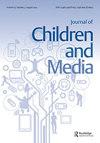“My mom just wants to know where I am”: Estonian pre-teens’ perspectives on intimate surveillance by parents
IF 2.1
3区 心理学
Q2 COMMUNICATION
引用次数: 2
Abstract
ABSTRACT Inspired by the communication privacy management theory the aim of our study was to explore pre-teens’ viewpoints and experiences related to their parents’ usage of child-tracking technologies. Relying on Q methodology and semi-structured individual interviews with 8- to 13-year-old Estonian pre-teens (n = 20) who were aware of parental tracking, we will present perspectives for understanding children’s viewpoints on intimate surveillance. Three participant perspectives emerged: Compliant Child, Autonomous Child, and Privacy-Sensitive Child. Although children in our sample viewed parents as their confidants and did not consider such tracking to breach their privacy boundaries, they expected these boundaries to be negotiated and collectively set within a family. IMPACT SUMMARY Prior State of Knowledge: Intimate surveillance of children has become a normalized part of present-day parenting practices. The use of tracking technologies can limit children’s experiences and have negative consequences for children’s privacy as well as parent-child relations. Novel Contributions: Empirical research on tracking technologies seldom focuses on the opinions and experiences of tracking technology users, nor on the views children have of these practices. The current study does both, using Q methodology as a novel means for capturing children’s subjective perspectives. Practical Implications: Our findings have implications for parents considering use of tracking technologies, encouraging a move toward a family climate more supportive of child autonomy.“我妈妈只是想知道我在哪里”:爱沙尼亚青少年对父母亲密监视的看法
摘要受通信隐私管理理论的启发,本研究旨在探讨学龄前青少年对父母使用儿童跟踪技术的看法和经历。依靠Q方法和对8- 13岁的爱沙尼亚前青少年(n = 20)的半结构化个人访谈,我们将提出理解儿童对亲密监视的观点的观点。三个参与者的观点出现了:顺从的孩子,自主的孩子和隐私敏感的孩子。虽然我们样本中的孩子将父母视为知己,并不认为这种跟踪侵犯了他们的隐私界限,但他们希望这些界限能够在家庭中协商和共同设定。影响总结先前的知识状况:对孩子的亲密监视已经成为当今育儿实践的常态化部分。追踪技术的使用可能会限制儿童的体验,并对儿童的隐私和亲子关系产生负面影响。新颖贡献:跟踪技术的实证研究很少关注跟踪技术用户的意见和经验,也很少关注儿童对这些实践的看法。目前的研究两者兼而有之,使用Q方法作为一种捕捉儿童主观观点的新方法。实际意义:我们的研究结果对考虑使用跟踪技术的父母具有启示意义,鼓励朝着更支持儿童自主性的家庭氛围发展。
本文章由计算机程序翻译,如有差异,请以英文原文为准。
求助全文
约1分钟内获得全文
求助全文

 求助内容:
求助内容: 应助结果提醒方式:
应助结果提醒方式:


